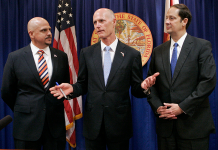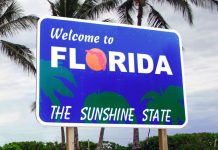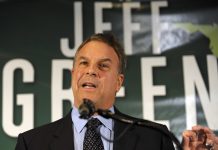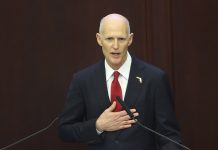Outgoing governor to take on Florida’s only statewide-elected Democrat

“This is the melting pot of the world.”
After months of speculation in which it seemed inevitable that Governor Rick Scott would challenge Senator Bill Nelson for the senior senator’s seat this november, Scott has made his intentions official both in an announcement Monday morning in Tallahassee.
In his statement, the governor targets Washington, D.C. as “a disaster” “dysfunctional” and full of “tired thinking.” Changing the city’s atmosphere is to be the focus of his opening salvo. Governor Scott also championed Florida’s response to helping Puerto Rico in the aftermath of Hurricane Maria, as well as Florida’s growing job market.
“People are flocking to Florida…Now we’ve got to take that same mission to D.C.” Scott’s comments did not directly attack Bill Nelson, but they did focus on career politicians. Senator Nelson may have been absent in the comments, but that may be because Rick Scott is running against Washington itself every bit as much as he’s running against Nelson in specific.
As the person Scott is challenging in the election has been a member of the Senate since the closing days of the Clinton Administration, a campaign centered around changing the Beltway is likely to catch the attention of many voters otherwise jaded by politics. This has become an effective strategy for Republicans, most notably in the 2016 Presidential Election.
Early polling—and keep in mind these polls were conducted before Scott’s official announcement—has the race close to even. According to Ballotpedia, the candidates split the polls, with numbers of undecided voters anywhere from 9% to 26%. If these early polls are to be believed, those undecided voters will be the fulcrum on which the election turns.
Guns and potential gun control legislation will be a focal point of the race between Scott and Nelson. Governor Scott has an A+ rating from the National Rifle Association, and while Florida’s response to the Parkland tragedy this February was criticized by the NRA it is a near certainty that the association will be in Scott’s corner for both voting and financial support. Nelson, meanwhile, is likely to continue to push for bans on certain semi-automatic rifles and universal background checks.
Scott also talked about term limits. That members of the United States Senate do not have term limits has been a point of contention before, and those who want change across the board in D.C. have suggested that imposing such limits will decrease worries about “politics as usual.”
Both candidates are likely to tout their records. Nelson, the incumbent senator, has been a popular Florida mainstay for decades. Scott’s statement focused largely on job creation and the growth that Florida has seen under his gubernatorial administration.
Nelson has been a senator for the Sunshine State since 2000. He was also a US Representative from 1978-1991, where he became the first member of the House of Representatives to travel outside of Earth’s atmosphere. In his previous election in 2012, Nelson defeated Republican Connie Mack by a margin of 55.2% to 42.2%. Against Scott, who is only leaving the Governor’s Mansion because his term limit is up, the former astronaut will be put to the test.
Scott is expected to win what is becoming a crowded Republican primary this August. The governor is the seventh person to stand for the GOP nomination this year, joining Augustus Sol Invictus, Latersea Jones, Howard Knepper, Martin Mikhail, Joe Smith, and Marcia Thorne in the race. None of the other six have the name recognition Scott brings, and it is highly unlikely that Governor Scott will see a serious challenge in the primary.
Likewise, Senator Nelson will be facing Tamika Lyles for the Democratic nomination. Lyles is not seriously expected to challenge Nelson for the nomination.
—
Interestingly, the state’s junior senator has as of yet not endorsed Scott and seems unlikely to get heavily involved. Marco Rubio speaks highly of Bill Nelson as a colleague, and has a generally positive and mutually-beneficial relationship with Scott.
Knowing of course that Rubio will need to work alongside anyone who wins in November, it makes sense that he would not be adamant about picking one side over the other and potentially alienating the other member of Florida’s senate contingent.
Expect attention on this race both local and national. Florida being one of the country’s most notable battleground states, the election between Scott and Nelson looks to be one of the most contentious in 2018.














